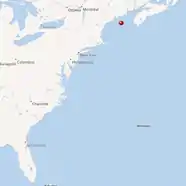SS Cornwallis
SS Cornwallis was a 5,438 gross register tons (GRT) steam merchant ship built in 1921 for the Canadian Government as Canadian Transporter.[3] In 1932 she was transferred to Canadian National Steamships Ltd[4][5] and renamed SS Cornwallis.[6] She was sunk on 3 December 1944 after being torpedoed by the German submarine U-1230 on its way to St John with a loss of 43 crew.[1]
| History | |
|---|---|
| Canada | |
| Name: |
|
| Operator: | Canadian National Steamships Ltd. |
| Port of registry: |
|
| Builder: | Coughlan J. & Sons Ltd. |
| Yard number: | 20 |
| Launched: | 31 August 1921 |
| Completed: | October 1921 |
| Out of service: | 3 December 1944 |
| Identification: |
|
| Fate: | Torpedoed by U-1230 |
| General characteristics | |
| Tonnage: | 5,458 GRT |
| Length: | 400 ft 5 in (122.05 m) |
| Beam: | 52.5 ft (16.0 m) |
| Depth: | 28.5 ft (8.7 m) |
| Propulsion: | Triple expansion steam engine |
| Speed: | 11 knots (20 km/h; 13 mph) |
| Crew: | 48 |
| Armament: | |
Construction and design
Cornwallis was built by J.Coughlan & Sons in Vancouver. British Columbia, Canada for the Canadian Government as a steam merchant vessel. She was built in yard 20 and was completed in October 1921.[7]
The ship had a length of 400 feet (120 m), a beam of 52.5 feet (16.0 m) and a depth of 28.5 feet (8.7 m). She had a gross register tonnage of 5,458.[2] As for propulsion, she was powered by a single 3-cylinder triple-expansion engine that drove one screw.[2] It developed 370 horsepower (280 kW) of which provided Cornwallis a top speed of 11 knots (20 km/h; 13 mph).[1][2]
History
From 1921 to 1932 Canadian Transporter was owned by the Canadian Government. In 1932 she was transferred to the Canadian National Steamships Ltd and was renamed Cornwallis.[3]
1938 Supreme Court of Canada Case
On 6 November 1935, a crew member was severely injured after a wave struck the deck of Cornwallis.[8] The operator Canadian National Steamships Ltd was taken to court and was sued for CAD 4,000 (2019 $73,730)[9] in damages.[8]
1942 First U-boat attack
.jpg.webp)
On 11 September 1942 while moored at the harbour of Bridgetown, Barbados she was fired upon by U-514 with multiple G7e torpedoes at a distance of 2,400 yards (2,200 m).[3] Although the majority of the torpedoes were caught by the harbour's torpedo net, a single torpedo managed to breach the net and hit Cornwallis just abreast of the #2 hold.[3] The ship sunk only partially due to its location in shallow waters. She was raised and then towed to the port at Trinidad and then towed again to Mobile on 24 January 1943. She would finish repairs in August 1943 and would subsequently return to service.[3][2][10]
1944 Second U-boat attack and sinking
On 20 November 1944, Cornwallis would leave Barbados with a cargo of sugar and molasses.[11] She left port with a crew complement of 48 including seven armed guards and a British DBS.[2] The ship's captain, Emerson Robinson, was instructed to sail unescorted through the Cape Cod Canal and then up the coast of New England before finally arriving at their destination Saint John.[3][1][2]
On 3 December 1944, she was spotted and fired upon by U-1230. At 06:00 a single torpedo struck the forward section of the ship.[11][12][13] An SOS radio call was sent out by the crew and was received at Yarmouth, Nova Scotia.[11]
The crew attempted to lower the amidships lifeboat on the starboard side but the lifeboat was caught on the davits rendering it unusable.[2] The ship would sink on its starboard side in under ten minutes.[2] Of the 48 crew members, only 6 would escape the sinking vessel and make their way to a lifeboat which had floated free when the vessel sunk. The survivors would later be picked up by fishing vessel Notre Dame with one perishing en route due to hypothermia.[2] The five survivors would be dropped off at Rockland, Maine.[14][15]
Official numbers and code letters
Official numbers were a forerunner to IMO Numbers. Cornwallis had an official number of 150448 and the Code Letters TPWB (![]()
![]()
![]()
![]() ). In 1932 her code letters were changed to VGBY (
). In 1932 her code letters were changed to VGBY (![]()
![]()
![]()
![]() ).[1]
).[1]
Wreckage

The wreckage of Cornwallis can be found 300 feet (91 m) beneath the ocean 10 miles (16 km) southwest of Mount Desert Rock in the Gulf of Maine. The coordinates of the wreckage are located approximately at 43.59°N 68.20°W.[3]
References
- Tony, Allen (2009-02-26). "HMCS Cornwallis (+1944)". WreckSite.
- Wiberg, Eric (2017-01-03). "HMCS Cornwallis sunk off Mt. Desert Maine in Dec 1944 by U1230/Hilbig; 43 perished". Eric Wiberg. Retrieved 2019-12-20.
- "Cornwallis (Canadian Steam merchant) - Ships hit by German U-boats during WWII - uboat.net". uboat.net. Retrieved 2019-12-20.
- "Cornwallis Delayed". The daily commercial news & shipping list. 1935-06-07.
- "For Halifax". The daily commercial news & shipping list. 1936-01-11.
- "Canadian National Steamships". The daily commercial news & shipping list. 1935-04-11.
- "Single Ship Report for "Cornwallis"". Miramar Ship Index.
- "Canadian National Steamships Co. Ltd. v. Watson". scc-csc.lexum.com. 2001-01-01. Retrieved 2019-12-21.
- "Inflation Calculator". Bank of Canada. Retrieved 2019-12-21.
- "Eric Joseph Charles La Couvee - The Canadian Virtual War Memorial - Veterans Affairs Canada". veterans.gc.ca. 2019-02-20. Retrieved 2019-12-20.
- "SS Cornwallis - Nova Scotia Casualties". wartimeheritage.com. Retrieved 2019-12-20.
- Kelshall, Gaylord; Graham, John (1994). The U-boat War in the Caribbean. Naval Institute Press. p. 452. ISBN 1557504520.
- Metzgen, Humphrey (2007). Caribbean Wars Untold. University of West Indies Press. p. 203. ISBN 9766402035.
- "Torpedoing of Cornwallis 11 Sept 1942 Barbados". BajanThings. 2015-05-21. Retrieved 2019-12-20.
- Hadley, Michael L. (1990-07-01). U-Boats Against Canada: German Submarines in Canadian Waters. p. 250. ISBN 0773508015.
